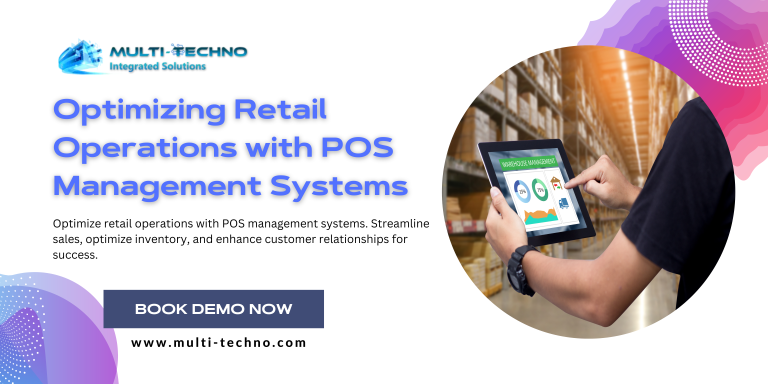Multi-Techno Integrated Solution

In the rapidly evolving retail industry, staying ahead of the competition requires efficient and streamlined operations. Point of Sale (POS) management systems have emerged as crucial tools for retailers to enhance operational efficiency, improve customer experience, and drive business growth. This article explores the benefits of POS management systems and how they can optimize retail operations for success.
Table of Contents
ToggleUnderstanding POS Management Systems
A POS management system is a software solution that combines hardware and software components to facilitate transactions and manage various aspects of retail operations. It encompasses functionalities such as inventory management, sales tracking, customer relationship management, reporting, and analytics. By centralizing and automating these processes, POS management systems provide retailers with real-time insights and enable them to make informed decisions.
Streamlining Sales and Transactions
Efficient sales and transaction management is at the core of retail operations. POS management systems simplify and streamline the sales process by automating tasks such as product scanning, pricing, and payment processing. This ensures faster and more accurate transactions, reducing waiting times and enhancing the overall customer experience. Additionally, sales data is instantly recorded and synchronized with inventory management, providing accurate stock levels and facilitating timely reordering.
Inventory Management and Optimization
Effective inventory management is vital for retail success. POS management systems provide real-time visibility into inventory levels, allowing retailers to track stock movement, identify popular products, and monitor replenishment needs. Automated inventory management features help prevent stockouts or overstock situations, optimize stock levels, and streamline the ordering process. This ensures that retailers have the right products available at the right time, minimizing lost sales and reducing carrying costs.
Customer Relationship Management (CRM)
Building strong customer relationships is key to retail success. POS management systems often include CRM functionalities that enable retailers to capture and analyze customer data. This data can include purchase history, preferences, and contact information. With this information, retailers can personalize marketing efforts, implement loyalty programs, and offer targeted promotions. By understanding customer behavior and preferences, retailers can enhance customer satisfaction and loyalty, ultimately driving repeat sales and customer advocacy.
Reporting and Analytics
Data-driven insights are invaluable for making informed business decisions. POS management systems provide robust reporting and analytics capabilities, allowing retailers to analyze sales performance, track key performance indicators (KPIs), and identify trends. By leveraging these insights, retailers can make data-backed decisions on pricing, promotions, inventory management, and operational strategies. This helps optimize operations, increase profitability, and adapt to changing market conditions effectively.
Multi-Store Management
For retailers with multiple locations, managing operations across various stores can be challenging. POS management systems offer multi-store management capabilities, enabling centralized control and coordination of inventory, pricing, promotions, and reporting. This ensures consistency across all stores, simplifies data management, and facilitates real-time visibility into the performance of individual stores or the entire retail chain. Retailers can easily analyze sales patterns, implement uniform pricing strategies, and ensure consistent customer experiences across all locations.
Integration with E-commerce Platforms
The growth of e-commerce has transformed the retail landscape. POS management systems often integrate seamlessly with e-commerce platforms, allowing retailers to manage both online and brick-and-mortar sales channels from a single system. This integration enables centralized inventory management, synchronized product information, and unified reporting. Retailers can offer omnichannel shopping experiences, streamline order fulfillment processes, and provide customers with options like buy-online-pick-up-in-store (BOPIS) or return-in-store. The integration of e-commerce and POS systems enables retailers to meet the evolving demands of modern consumers and stay competitive.
Scalability and Flexibility
As retail businesses expand, scalability and flexibility become critical considerations. POS management systems are designed to accommodate growth and changing needs. They can handle increasing transaction volumes, support additional stores or sales channels, and adapt to new retail trends or technologies. Retailers can easily scale their operations within the POS system, add new functionalities, or integrate with other business systems. This scalability ensures that retailers can efficiently manage their operations as they grow and evolve.
Conclusion
In the dynamic and competitive retail industry, optimizing operations is essential for success. POS management systems provide retailers with the tools to streamline sales, automate transactions, manage inventory, enhance customer relationships, and gain valuable insights through reporting and analytics. By leveraging the power of POS management systems, retailers can enhance operational efficiency, improve customer experiences, and drive business growth in today’s evolving retail landscape. Investing in a robust and integrated POS management system is a strategic decision that empowers retailers to stay ahead of the competition and thrive in the digital age mattis, pulvinar dapibusleo.
About Us
ERP software and systems are designed and implemented by Multi-Techno, a registered company. By combining data from financials, sales, CRM, inventories, and operations, businesses can increase productivity, make better decisions, and increase profitability with the aid of our ERP System, a single, integrated software platform.
Quick Links
Contact Us
Office # 100, 101 Second Floor Kohinoor 1, Faisalabad, Pakistan
